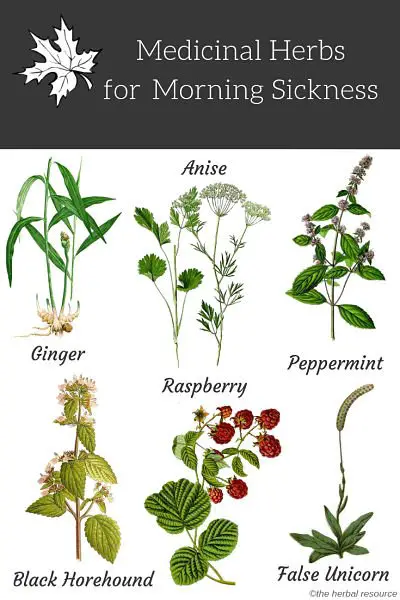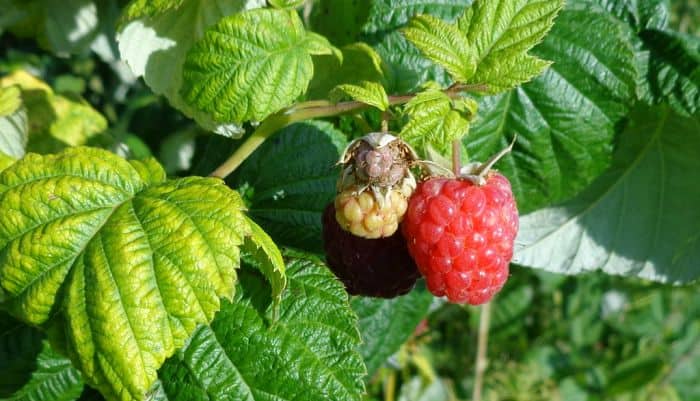The use of medicinal herbs for morning sickness remedy and relief has been a part of traditional herbal medicine for a long time.
Many of these natural herbs can be of great help to alleviate or even eliminate the symptoms associated with morning sickness.
Some of these medicinal plant or herbs for morning sickness treatment have undergone medical evaluations and are supported by scientific evidence while others can only be supported by anecdotal evidence.
As with any other forms of medication, be it medicinal herbs or other natural remedies, it is always a good idea to first consult a medical practitioner.

Some Common Medicinal Herbs For Morning Sickness Relief
Ginger
Ginger (Zingiber officinale) is probably one of the most popular medicinal herbs for morning sickness. Ginger has a long historical use as a natural treatment for nausea and vomiting.
In fact, it is a staple in both Chinese and Ayurvedic medicine. Present day clinical trials have confirmed that it does soothe the digestive system and decreases the severity of nausea. Ginger can be taken in a powdered form or steeped in hot water to make a tea. (1)
Although classified by the Food and Drug Administration as being generally safe, there have been some concerns regarding its prolonged use. However few clinical studies have found evidence of any adverse effects. (2)
Peppermint
Peppermint (Mentha piperita) is a medicinal herb that has a calming effect. It helps to aid in digestion and also assists the flow of bile.
Peppermint is commonly recommended for the treatment of nausea and morning sickness. Recent studies have substantiated the power of peppermint in calming and settling the stomach. (3)
The medicinal properties of the peppermint herb can be attributed to menthol. Menthol is a natural cooling, anesthetic for the stomach.
In the nineteenth-century, menthol vapors were used for the treatment of morning sickness.
Anise
Anise seeds (Pimpinella anisum) are known as detoxifying and calming agents. They can offer treatment for heartburn and associated discomfort.
Anise has been used traditionally in many different cultures to reduce or eliminate symptoms of morning sickness and other issues with nausea. (4)

Raspberry
While there are no scientific studies to support the use of raspberry (Rubus idaeus) as one of the effective herbs for morning sickness, it has strong traditional roots and reputation as a treatment for a variety of “female” conditions such as menstrual cramps, morning sickness, and labor pains. (5)
Black Horehound
Black Horehound (Ballota nigra) is a customary natural treatment for both motion sickness and morning sickness.
The taste of this herb is a little harsh so it is often mixed with other herbs such as chamomile and meadowsweet.
Persons who have allergies to aspirin should, however, avoid the use of meadowsweet since it contains a similar compound. (6)
Other Natural Herbs That Have Been Used for Morning Sickness Relief
- Chamomile – (Chamomilla recutita )
- Peach – (Prunus persica)
- Cabbage – (Brassica oleracea)
- False Unicorn – (Chamaelirium luteum)
- Galangal – (Alpinia officinarum)
Supporting References – Online
- Lete, I., & Allué, J. (2016). The Effectiveness of Ginger in the Prevention of Nausea and Vomiting during Pregnancy and Chemotherapy. Integrative medicine insights, 11, 11–17. doi:10.4137/IMI.S36273.
- Viljoen, E., Visser, J., Koen, N., & Musekiwa, A. (2014). A systematic review and meta-analysis of the effect and safety of ginger in the treatment of pregnancy-associated nausea and vomiting. Nutrition journal, 13, 20. doi:10.1186/1475-2891-13-20.
- Pasha, H., Behmanesh, F., Mohsenzadeh, F., Hajahmadi, M., & Moghadamnia, A. A. (2012). Study of the effect of mint oil on nausea and vomiting during pregnancy. Iranian Red Crescent medical journal, 14(11), 727–730. doi:10.5812/ircmj.3477.
- Shojaii, A., & Abdollahi Fard, M. (). Review of Pharmacological Properties and Chemical Constituents of Pimpinella anisum. ISRN pharmaceutics, 2012, 510795. doi:10.5402/2012/510795.
- Assessment report on Rubus idaeus L., folium. European Medicines Agency. Committee on Herbal Medicinal Products (HMPC). 28 January 2014. EMA/HMPC/44209/2012.
- Ali Esmail and Al-Snafi. THE PHARMACOLOGICAL IMPORTANCE OF BALLOTA NIGRA –A
REVIEW. Indian Journal of Pharmaceutical Science & Research. Vol 5 Issue 4 2015. 249-256. Department of Pharmacology, College of Medicine, Thiqar University, Nasiriyah, Iraq.
Supporting References – Offline
Newall C , et al.: Herbal Medicines: A Guide for Healthcare Professionals. London. Pharmaceutical Press. 1996.
Ernst E .: Herbal medicinal products during pregnancy: are they safe? BJOG. 2002.
Hobbs, Christopher: Herbal Remedies For Dummies. For Dummies; 1 edition. 1998.
Tarr, Katherine.: A Guide to Motherhood – Herbs, Helps, & Pressure Points for Pregnancy and Childbirth. Winona Lake, Indiana. Wendell W. Whitman Company. 2008.
Thordur Sturluson
Latest posts by Thordur Sturluson (see all)
- What is the Difference Between Hemp and Marijuana? - June 3, 2019
Leave a Reply